- Home
- Simon Kernick
Die Twice
Die Twice Read online
The author and publisher have provided this e-book to you for your personal use only. You may not make this e-book publicly available in any way. Copyright infringement is against the law. If you believe the copy of this e-book you are reading infringes on the author’s copyright, please notify the publisher at: us.macmillanusa.com/piracy.
Contents
Title Page
Copyright Notice
Foreword
The Business of Dying
Dedication
Part One: Introducing the Dead
Chapter 1
Chapter 2
Chapter 3
Chapter 4
Chapter 5
Chapter 6
Chapter 7
Part Two: Hunting the Living
Chapter 8
Chapter 9
Chapter 10
Chapter 11
Chapter 12
Chapter 13
Chapter 14
Chapter 15
Chapter 16
Chapter 17
Chapter 18
Part Three: Unravelling
Chapter 19
Chapter 20
Chapter 21
Chapter 22
Chapter 23
Chapter 24
Chapter 25
Chapter 26
Chapter 27
Chapter 28
Chapter 29
Chapter 30
Part Four: The Business of Dying
Chapter 31
Chapter 32
Chapter 33
Chapter 34
Chapter 35
Chapter 36
Chapter 37
Chapter 38
Chapter 39
Chapter 40
Epilogue
The Murder Exchange
Dedication
Now
Tuesday, nineteen days ago
Thursday, seventeen days ago
Friday, sixteen days ago
Saturday, fifteen days ago
Sunday, fourteen days ago
Monday, thirteen days ago
Wednesday, eleven days ago
Introducing Krys Holtz
Thursday, ten days ago
Friday, nine days ago
Saturday, eight days ago
Monday, six days ago
Tuesday, five days ago
Wednesday, four days ago
Thursday, three days ago
Friday, two days ago
Yesterday
Today
Wednesday, three days later
Monday, eight days later
Epilogue
Acknowledgements
Also by Simon Kernick
Copyright
FOREWORD
by Lee Child
What’s up with English crime fiction?
It’s a question that gets asked with some regularity, and right now—early 2006—it’s a newly relevant question, because our genre’s Third Age is drawing inexorably to a close. A century ago the First Age was all about Arthur Conan Doyle and Sherlock Holmes. In hindsight we see that the Second Age—in full flower seventy years ago—was codominated by Agatha Christie and Dorothy Sayers. Then, perhaps thirty years later, the Third Age took over, with Ruth Rendell and P. D. James hitting their magisterial strides. For a hundred years, very little was published in the genre that didn’t owe practically everything to one of those five authors. Sleuths that were amateur, or brainy, or aristocratic, or “more than” mere policemen, or eccentric, or unlikely, or who had arcane hobbies and enthusiasms … we’ve been there and done that. And what a ride it was. But now, with the grand dames—literally—Rendell and James on their last lap, what comes next?
Or, what’s up with English crime fiction?
The same things that are up with England itself, really. Three factors are becoming increasingly massive over there—the nation is more than ever metrocentric, more than ever multicultural, and less than ever dominated by class.
England has in fact always been completely dominated by London. It’s a small country with a huge capital city. It’s a fact of life inside the country and out. People in the United States hear that I’m from England, and their next question is usually, “Which part of London did you live in?” But now the phenomenon is even greater than ever.
And London (and therefore England, remember) is now a huge ethnic mosaic, in my experience easily rivaling New York City for diversity. It’s another fact of life, so well accepted now that it’s no longer even worthy of notice or comment.
London is now an overwhelmingly middle-class city, which in traditional English terms means no class at all. Birth and accent mean very little there anymore. When I opened my first bank account—too many years ago to happily contemplate—you could pretty much guarantee that a bank manager would be white, from sturdy English stock, and educated at one of a narrow band of schools. Now you could pretty much guarantee that she wouldn’t be any of those things.
The Fourth Age of English crime fiction writers grew up with these changes. They’ve internalized them. To their elders, class was always an issue. Stock, semicomic stereotypes were plucked from the lower orders and paraded for our smug amusement. Lord Peter Wimsey could quell a street riot with his accent alone. And wasn’t he wonderful to accept a middle-class Scotland Yard Inspector as his brother-in-law! Faint but clear echoes of the same attitudes are clearly audible in the bucolic fantasy that is Kingsmarkham.
Fourth Age writers are past all that. That class is a dead issue is beyond taken for granted by them.
Their elders put people of color and non-English ethnicity into crime fiction from the start, but mostly as curiosities, often as villains, and never quite to be trusted. Fourth Age writers are past all that. Their casts of characters are as instinctively multicultural as the London phone book.
And their elders usually glamorized London itself: Scotland Yard was presented as an effortless center of excellence in comparison to dull provincial capabilities. “They’ve called in Scotland Yard” was as great an accolade as a rural crime could ever earn. Addresses in London were chosen for their glitter: Piccadilly and Belgravia—or maybe Bloomsbury, if some real sense of edge was required.
Fourth Age writers are past all that. London is where life happens, nothing more, nothing less, on the outskirts, near the M25 Beltway, out at Heathrow, in parts we’ve never heard of, but should have.
Fourth Age writers have moved on. And we should move on with them. Perhaps with Simon Kernick in particular, because he might just be the best of them. I’ve read all his books, purely as a fan. They’ve got great plots, great dialogue, great action, and some spectacular violence. But what strikes me most is how they’re rooted in a kind of effortless modern authenticity. They’re real. They’re what England is today. In fact, all the above musing was generated by one simple question I asked myself: “How does he do that?”
So, what’s up with English crime fiction? Simon Kernick is, that’s what.
The Business of Dying
For Sally
Thanks to all those who helped in both the writing and the publication of this book.
You know who you are.
Part One
INTRODUCING THE DEAD
1
There’s a true story that goes like this. A few years back a thirty-two-year-old man abducts a ten-year-old girl from the street near her house. He takes her back to his dingy bedsit, ties her to a bed, and subjects her to a brutal hour-long sex ordeal. It might have been a lot worse had the walls not been paper thin. One of the neighbours hears the screams, phones the police, and they come and knock the door down. The girl is rescued, although apparently she still bears the scars, and the perpetrator is arrested. Seven months later he goes on trial and his lawyer gets him o
ff on a technicality. Apparently she takes the legal view that it’s better that ten guilty men go free than one innocent one’s imprisoned. He returns to the area where he committed the crime and lives the life of a free man. The lawyer gets her money, courtesy of the taxpayer, as well as the congratulations of her partners on a worthy performance. They probably even take her out for a celebration drink. Meanwhile, every parent in a two-mile radius of this guy is living in fear. The police try to defuse the situation by saying they’ll keep a good watch on him, but admit there’s nothing else they can do. As always, they appeal for calm.
Three months later, the girl’s dad gets caught pouring petrol through the guy’s letterbox. The police, for once, have been true to their word and are actually watching the place. He’s arrested, charged with arson and attempted murder, and remanded in custody. The local newspaper sets up a campaign to free him and starts a petition that gets something like twenty thousand signatures. Predictably the powers-that-be ignore it, interest fades, and then, before his case comes to trial, the dad hangs himself in his cell. Is this the tale of a progressive, forward-looking society, or one that’s about to go down the pan? You tell me.
But the moral of the story, that’s easier. If you’re going to kill someone, plan it.
* * *
9.01 p.m. We were sitting in the rear car park of the Traveller’s Rest Hotel. It was a typical English November night: dark, cold and wet. Not the best time to be out working, but who can choose their hours these days? The Traveller’s Rest didn’t look very restful at all. It was one of those modern redbrick structures with loud lighting, revolving doors, and that curse of modern times, a weekly karaoke night. The one thing going for it was the fact that the front car park had been shut for resurfacing. This meant our quarry would have to come round the back, away from the main entrance, and hopefully away from any stray civilians. Would they smell a rat? I doubted it. Not until it was too late anyway.
I hate the waiting. It’s the worst part. It gives you too much time to think. So I lit a cigarette and took a long but guilty drag. Danny wrinkled his nose but he didn’t say anything. He doesn’t like smoking but he’s not the kind to make a big deal about it. He’s a tolerant sort. We’d been talking earlier about this case of the ‘alleged’ paedophile and Danny had been the one supporting the lawyer’s ten guilty-men argument, which was typical of him. And bullshit too. Why the suffering of many is seen as being preferable to the suffering of one is beyond me. It’s like running a TV station where twenty million viewers want to see gameshows and two million want to see operas, and only showing operas. If the people who believed it ever ran a business, it’d go bust in a day.
But I like Danny. And I trust him. We’ve worked together a long time and we know each other’s capabilities. And that, in our line of business, is the key.
He opened the driver’s side window to let some air in and I shivered against the cold. It really was a shitty night.
‘Personally, I’d have gone after the lawyer,’ I said.
‘What?’
‘If I was that girl’s dad, I would have gone for the lawyer rather than the rapist.’
‘Why? What good would that have done?’
‘Because there’s an argument that the rapist couldn’t help what he did, that his urges were just too much to handle. I’d still cut his balls off, but that’s not the point. The point is, the lawyer had the choice not to defend him. She was an intelligent, rational woman. She knew what he’d done and still she did all in her power to put him back on the streets. Hers was therefore the greatest crime.’
‘I don’t understand that argument at all.’
‘The greatest evil in the world comes not from those who perpetrate it, but from those who excuse it.’
Danny shook his head like he couldn’t believe what he was hearing. ‘Jesus, Dennis, you’re beginning to sound like some sort of Angel of Death. You want to calm down a little. It’s not as if you’re whiter than white yourself.’
Which was true. I wasn’t. But I consider myself to have principles – codes of conduct to which I strictly adhere – and that, I felt, gave me the justification to say my piece.
I was about to tell Danny this when the radio crackled into life.
‘All right, they’re here,’ hissed the disembodied voice. ‘Black Cherokee, three occupants. It’s them.’
Danny started the engine while I slid silently out of the car, flicked the cigarette away, and walked towards the spot where the Cherokee would appear, knowing that this was going to be the one and only chance I was going to get.
There was a clank as it hit the speed ramp, then it came round the side of the main building and drove slowly into the car park, looking for a place to stop. I broke into a jog, waving my hands to get the driver’s attention. In my Barbour jacket and shirt and tie, I looked every inch the harassed businessman.
The Cherokee continued moving but came to a halt as I reached the driver’s side window and banged on it. ‘Excuse me, excuse me.’ My voice was different now. Higher pitched, less confident.
The window came down and a hard-looking sod with a square jaw that looked like it was made of cast iron glared out at me. I put him at about thirty-five. My face dissolved into nerves. Both the driver and his front-seat passenger, a smaller, older guy with Brylcreemed hair and a greasy face, were already relaxing. They saw me as no threat. Just a man who pays his taxes and does what he’s told for a living. I heard the one in the back mumble something but I didn’t even look at him.
‘What do you want?’ demanded the driver impatiently.
‘Er, I was wondering…’
I brought the gun up from my pocket, had this momentary paranoia that I might not have released the safety, and shot him twice in the right eye. He made no sound, simply fell back into his seat, head tilted to one side, and shivered out the final ounces of his life.
The front passenger swore loudly and immediately flung up his arms in a futile effort to protect himself. I leaned down slightly to get a better view of him and pumped out a further two rounds. One hit him in the elbow, the other in the jaw. I heard it crack. He shrieked in pain and then coughed violently as his mouth filled with blood. He tried to retreat in his seat, scrabbling about like a madman, unable to accept the fact that it was all over. I steadied myself and fired again, hitting him square in the forehead. The window behind him bloomed with red and his greasy features immediately relaxed. So far the whole thing had taken about three seconds.
But the one in the back was quick. He was already swinging open the door and coming out with what looked like a gun in his hand. I didn’t have time to take a closer look. Instead I retreated three steps and squeezed the trigger as he came into view. I got him somewhere in the upper body but still he kept coming, and fast. I continued firing, holding the gun two-handed, teeth clenched against the noise that was exploding in my ears. The momentum of the bullets forced him backwards, driving him into the door. He did a manic, confused dance to the tune of the gunfire, his arms and legs flailing, and angry red spots appeared like pox on his crisp, white shirt.
And then the magazine was empty and everything stopped as suddenly and dramatically as it had begun.
For a second he remained upright, holding onto the door for support, the energy almost visibly leaking out of him. Then he sort of half fell, half sat down, losing his grip on it in the process. He looked down at the blood on his shirt, and then at me, and I got a good look at his face, which I didn’t want at all, because it was young, maybe late twenties, and his expression was all wrong. What I mean is, it wasn’t the expression of a sinner. There was no defiance there, no rage. Just shock. Shock that his life was being stolen from him. He looked like a man who didn’t think he deserved it, and that was the moment when I should have known I’d made a terrible mistake.
Instead, I turned away from his stare and reloaded. Then I stepped forward and shot him three times in the top of the head. The mobile phone he was carrying clattered noisi
ly to the ground.
I dropped the gun into my jacket pocket and turned towards Danny, who was now bringing the car round.
Which was when I saw her, maybe fifteen yards away, standing in the light of the rear firedoor, a bag of rubbish in each hand. No more than eighteen and looking right at me, still too shocked to realize that what she was witnessing was real. What do you do? A movie pro would have taken her out with a single shot to the head, although there was no guarantee I’d even have hit her from where I was standing. And anyway, I’m not interested in hurting civilians.
Her hand went to her mouth as she saw I’d seen her, and I knew that any moment she was going to let out a scream that would probably wake the dead, which, with the dead only just being dead, I didn’t want at all. So I lowered my gaze and hurried round to the passenger door, hoping that the gloom and wet had obscured my features enough to make any description she gave worthless.
I jumped in and kept my head down. Danny didn’t say a word. He just hit the pedal and we were out of there.
It was 9.04.
* * *
The journey to our first change of transport took exactly four minutes and covered a distance of approximately two and a half miles. We’d parked a Mondeo in a quiet piece of Forestry Commission land earlier that day. Danny now pulled up behind it, cut the engine, and got out. I leaned under the passenger seat and removed a full five-litre can of petrol which I liberally sprinkled over the car’s interior. When it was empty, I got out, lit a book of matches, stepped back so I was well out of the way, and flung them in, followed by the murder weapon and the two-way radio I’d been using. There was a satisfying whoosh as the petrol ignited, followed by a wave of heat.
When they came across the mangled wreckage it wouldn’t tell them anything. We hadn’t left any fingerprints and the car itself would be almost impossible to trace. It had been stolen in Birmingham six months ago, given new plates and a respray, and stored in a lock-up in Cardiff ever since. In this line of business, you can never be too careful. Contrary to popular belief, most detectives couldn’t detect a heartbeat on a speed addict, but you never know when you might be up against the next Ellery Queen.

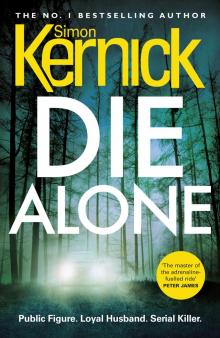 Die Alone
Die Alone Deadline
Deadline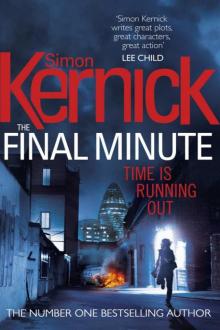 The Final Minute
The Final Minute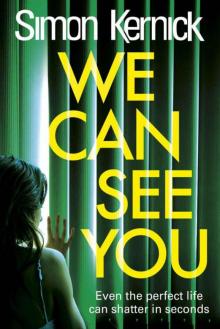 We Can See You
We Can See You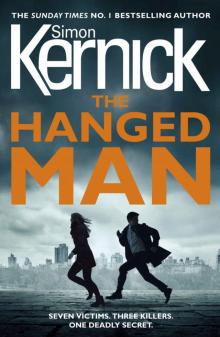 The Hanged Man (Bone Field 2)
The Hanged Man (Bone Field 2)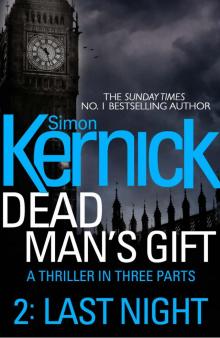 Dead Man's Gift 02 - Last Night
Dead Man's Gift 02 - Last Night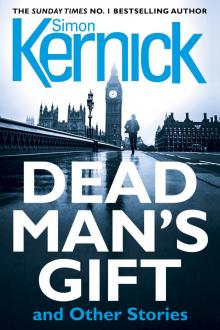 Dead Man's Gift and Other Stories
Dead Man's Gift and Other Stories A Good Day To Die
A Good Day To Die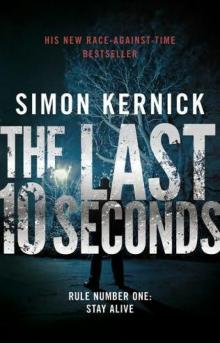 The Last 10 Seconds
The Last 10 Seconds The Murder Exchange
The Murder Exchange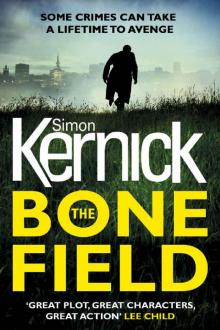 The Bone Field
The Bone Field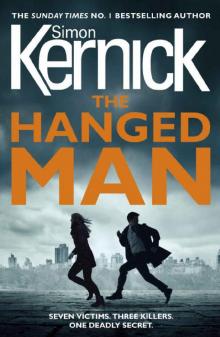 The Hanged Man
The Hanged Man Target
Target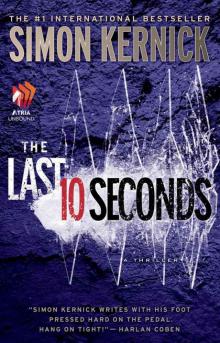 The Last 10 Seconds: A Novel
The Last 10 Seconds: A Novel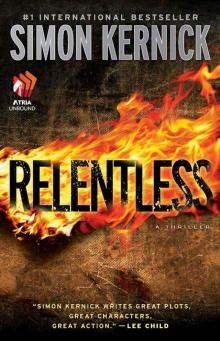 Relentless: A Novel
Relentless: A Novel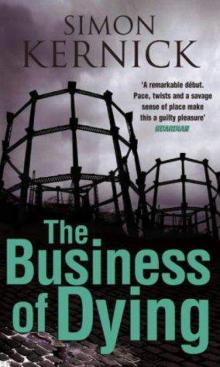 The Business Of Dying
The Business Of Dying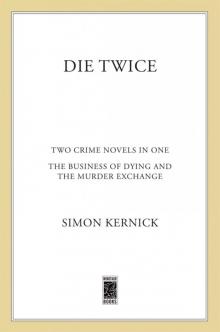 Die Twice
Die Twice Flytrap
Flytrap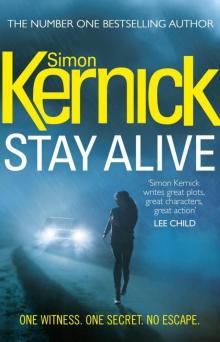 Stay Alive
Stay Alive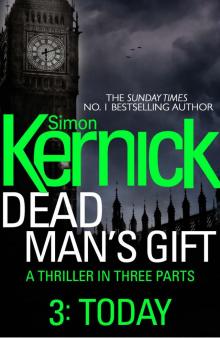 Dead Man's Gift 03 - Today
Dead Man's Gift 03 - Today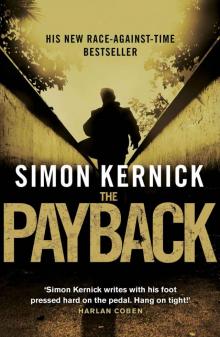 The Payback
The Payback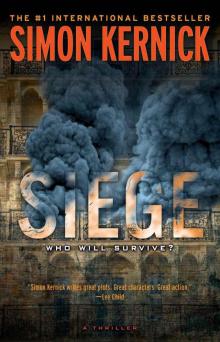 Siege: A Thriller
Siege: A Thriller The Crime Trade
The Crime Trade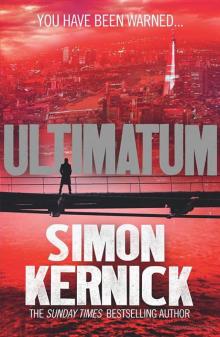 Ultimatum
Ultimatum